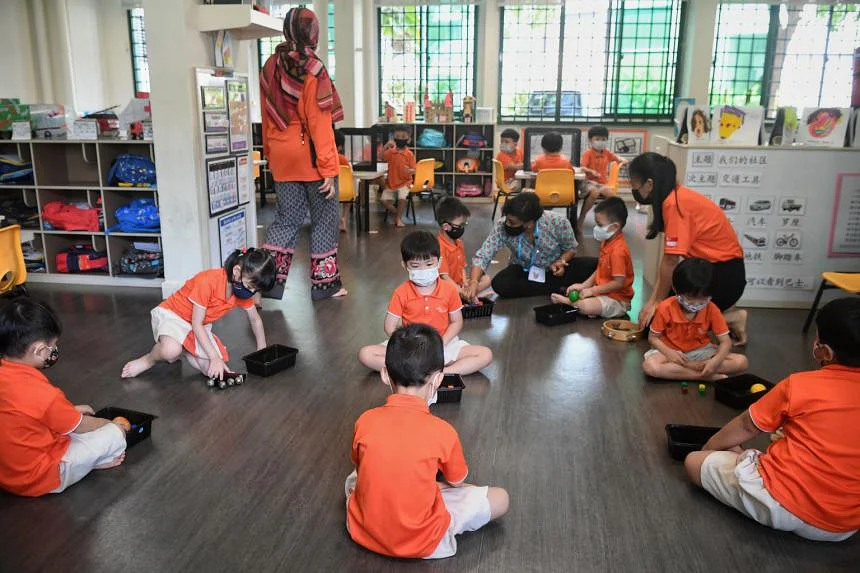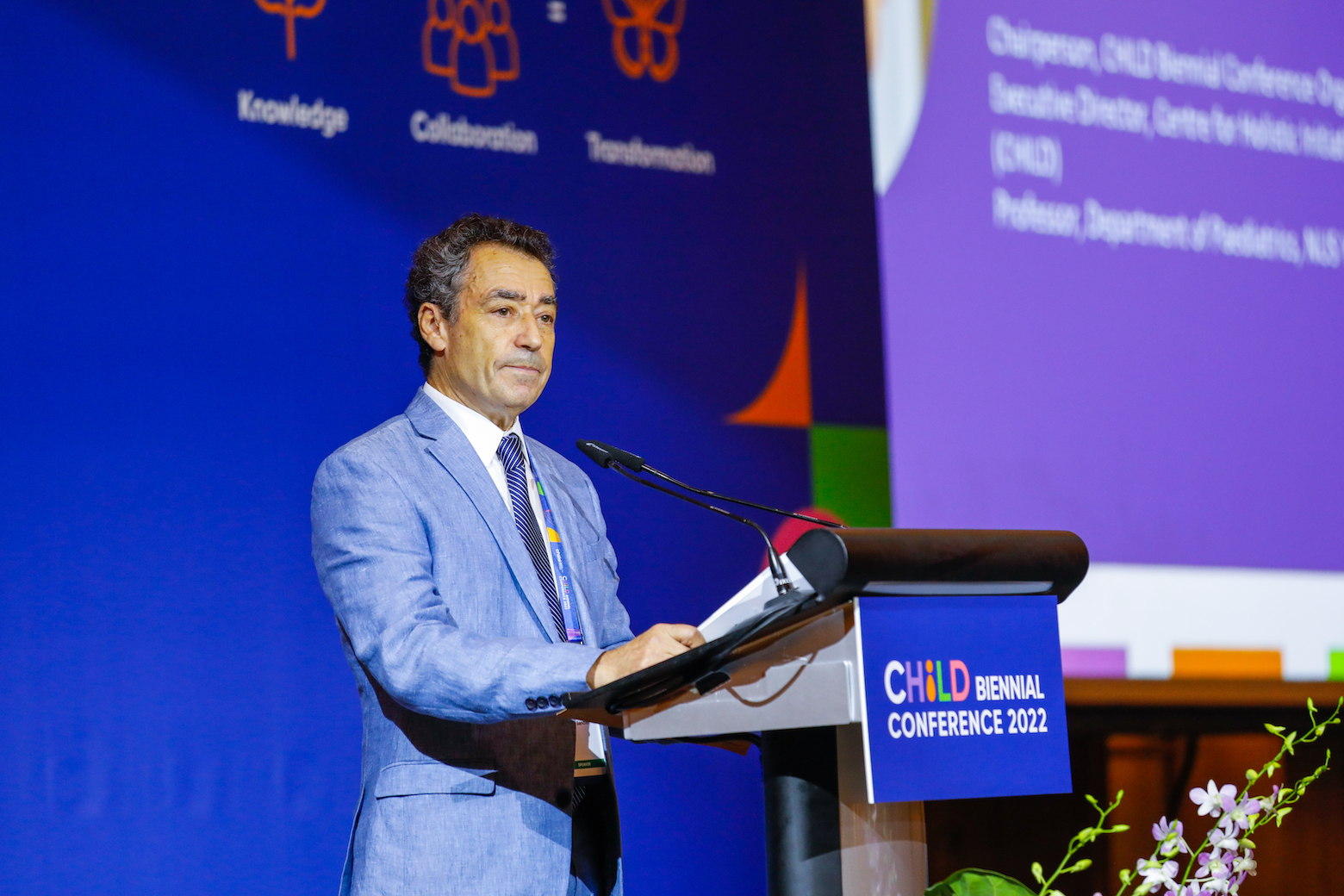BRANDED CONTENT
A major effort is underway to boost early childhood development and improve outcomes among the young
The Centre for Holistic Initiatives for Learning and Development seeks to bridge the gap between research and implementation

The Centre for Holistic Initiatives for Learning and Development is partnering with local preschools and childcare centres to trial run its early childhood intervention programmes.
PHOTO: ST FILE
Jeremy Theseira, Content STudio
Follow topic:
Years into the future, when today’s children grow into healthy, well-adjusted adults, it will be thanks in part to a major initiative now making headway.
The initiative: A multi-collaborative effort to better understand early childhood development.
The man leading the initiative is Professor Adrian Sandler, 65, a specialist with over 30 years of experience in developmental and behavioural paediatrics.
His work in clinical care, programme development and research in the US taught him how support for vulnerable young children and their families could lead to better outcomes.
Prof Sandler is executive director of the Centre for Holistic Initiatives for Learning and Development (Child) in Singapore.

In his opening address at the Child conference last month, Prof Sandler said that the translation of child development research into policy and practice is both urgent and important.
PHOTO: YONG LOO LIN SCHOOL OF MEDICINE, NATIONAL UNIVERSITY OF SINGAPORE
Child is a multi-collaborative effort to translate early childhood research into targeted intervention. It focuses on three main areas: translational research, implementation science, and expertise in early childhood development.
“It was a very special and unique opportunity,” says Prof Sandler, who joined Child in January. “It is a chance to focus on translating child development research into policy and practice, improving children’s outcomes across the population, rather than child by child.”
Based at the National University of Singapore’s (NUS) Yong Loo Lin School of Medicine, Child was started in 2020 with a $30 million endowment from philanthropic organisation Lien Foundation.
Its other founding partners are the Centre for Evidence and Implementation and Agency for Science, Technology and Research’s Singapore Institute for Clinical Sciences (SICS).
“The mission is to improve the emotional, social and cognitive development of children in Singapore,” says Prof Sandler.
Child’s work leverages on a wealth of insights from the Growing Up In Singapore Towards Healthy Outcomes (Gusto) study, which has collected extensive data on the health, growth and development of local mothers and their children since 2009.
The cohort study, which has over 1,000 volunteers, is a collaborative effort led by KK Women’s and Children’s Hospital, the National University Health System, NUS, and SICS.
Last month, Child held its first conference at the Grand Copthorne Waterfront hotel, where it brought together international researchers, practitioners and policymakers to build on early childhood development.
Turning knowledge into action
Focusing on early childhood development is not only a worthwhile investment of time and effort, but imperative for a society to move forward, says Prof Sandler.
“The Government is really focused on improving human potential and addressing challenges to well-being, recognising that its people are its No. 1 resource,” he says. “It’s a remarkable opportunity here in Singapore.”
While still in its early years, Child has already made headway in moving the needle towards improving outcomes for children and families.
Last year, Child released three research briefs that distil the findings of the Gusto study into actionable insights. Broadly, these are:
Key insights
- 16%
Of students between the ages of 6 and 18 are estimated to be overweight. Cultivating positive eating behaviours plays an important role in curbing these trends.
- 90%
Of children below the age of two had daily exposure to digital device screens. High levels of passive viewing of digital media during early years have implications on attention, executive functions and social-emotional skills.
- 40%
Of mothers reported depression and anxiety during pregnancy. Findings suggest that this can impact a child’s brain development.
From this, Child has worked on two intervention programmes: the Appetite Toolbox, developed with SICS, and the Enhancing and Supporting Early Development to Better Children’s Lives (Easel) Approach.
The Appetite Toolbox was developed to address rising childhood overweight and obesity rates. Last year, 16 per cent of students aged between six and 18 were overweight, according to Ministry of Health numbers. This is an increase from 13 per cent in 2017, and 11 per cent in 2013.
Gusto found that eating behaviours – such as eating larger portions, eating fast and eating without feeling hungry – were contributing to increased food intake and weight gain among some children.
The toolbox, which is designed to help preschool children regulate their eating habits, consists of a series of learning materials such as story books, a hunger and fullness scale, classroom activities, and lesson plans on cultivating positive eating behaviours.
A pilot trial of the Appetite Toolbox across six PAP Community Foundation Sparkletots preschools ends this month.
The Easel Approach, now being developed, aims to help early childhood educators support children’s social, emotional, behavioural, and executive functioning outcomes by enhancing everyday practices in the classroom. The trial will begin in January next year with a number of local childcare centres.
“Children are our greatest resource, and the early years present the greatest opportunity to build resilience,” says Prof Sandler. “We are very encouraged about the progress that we have made in this short time.”
- Head to thechild.sg to learn more about Child’s work in the early childhood sector
Brought to you by Yong Loo Lin School of Medicine, National University of Singapore

